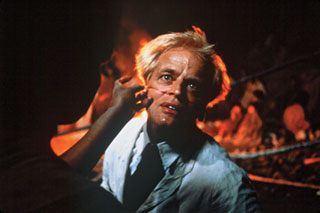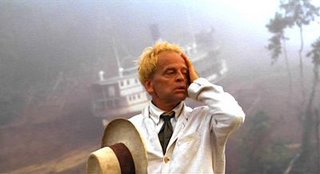
I watched Herzog’s Fitcarraldo recently, for the first time in about twenty years ( I don’t actually remember getting through to the end the first time I watched it – probably one of those late night BBC2 films that you feel as a aspiring teenage intellectual you ‘should’ watch). It’s a strange film – weirdly uncomplex in a lot of ways – it seems at first to suggest that it is going to be about a man’s madness, but then it seems to just be the madness. It exists in a weird kind of loop – Fitcarraldo is mad for doing what he does, dragging a boat over a hill, but in order to show him exhibiting this madness, Herzog does exactly the same – what is shown in the film is as crazy outside the film as it is within. It’s like some strange loop – the film doesn’t just illustrate madness, it conjures it up for its own sake. You end up watching, and analysing the filmmaking and the filmmaker as much as the film.
There’s something compelling about a film wherein the filmmaker’s personality and worldview run so thick. It’s like there’s an edge of madness to them, an inherent, almost unwitting, compulsion to get what’s inside them out there onto the screen.
The day after watching Fitzcarraldo, I ended up going out to see a new British comedy film. Probably because of the proximity of the viewing experiences, I couldn’t help but compare the two (unfair in a lot of ways – it’s difficult to see the two films pitching for the same audiences). And what was most striking about the British film was how mild it was – everything in it was unsurprising, typical and stereotypical, designed, seemingly, to pull an audience in with a promise of the familiar. It lacked any element of the madness that runs through a film like Fitzcarraldo.
I like that sense of madness in films, that sense of an idea unchecked, allowed to pursue its course – it feels like you’re being taken somewhere you haven’t been before. I enjoy it when a film feels like it’s the conscious or unconscious working out of an obsesssion, or a desire, or a fury, or a fetish. Films put you in the position of looking at events through the eyes of another, and it’s always more interesting to me when you can really feel the presence of a personality alongside you, directing you to focus on how you’re seeing what you’re seeing, forcing you to see those things in a different way. Better to have that edge of madness alongside you, than a mildness that gets washed away the minute you leave the cinema.




No comments:
Post a Comment